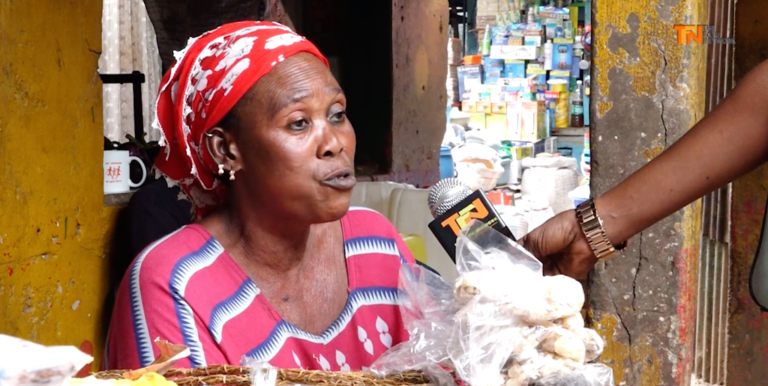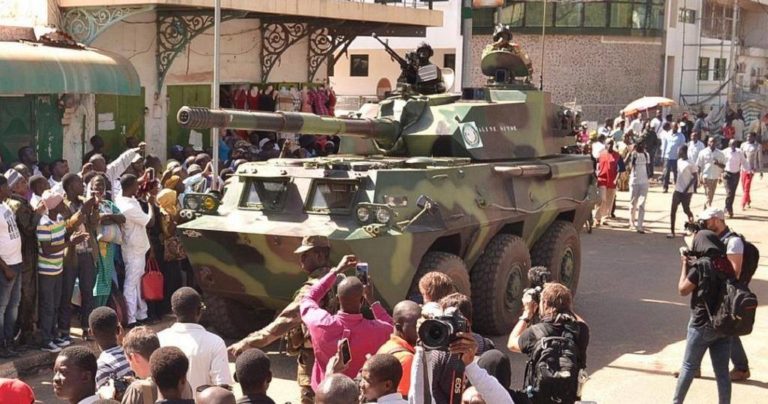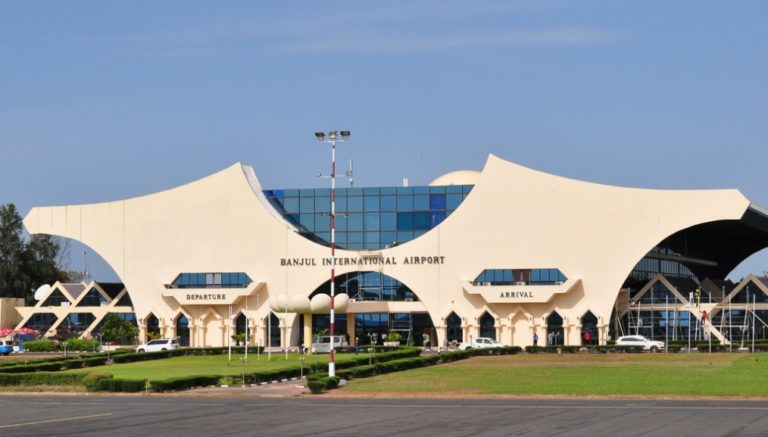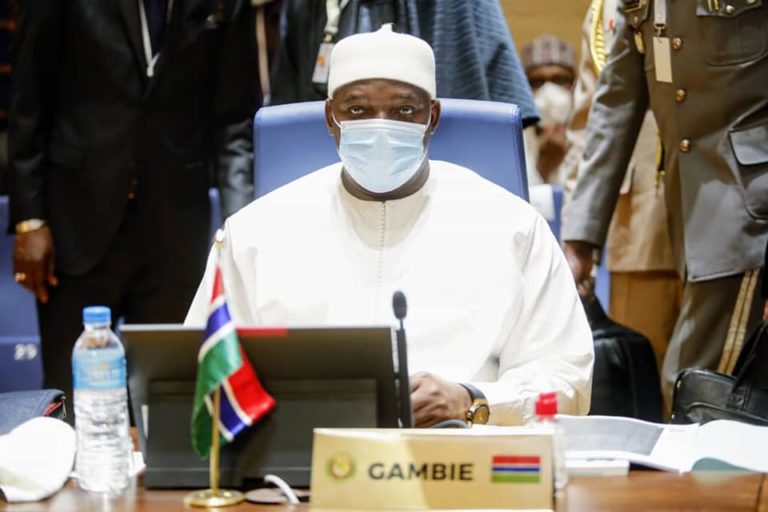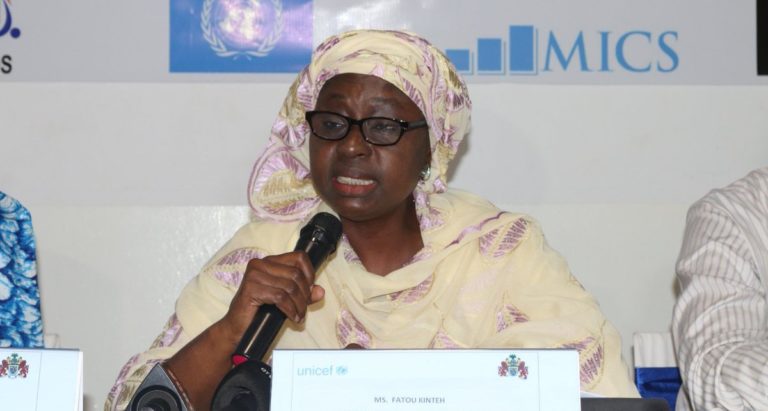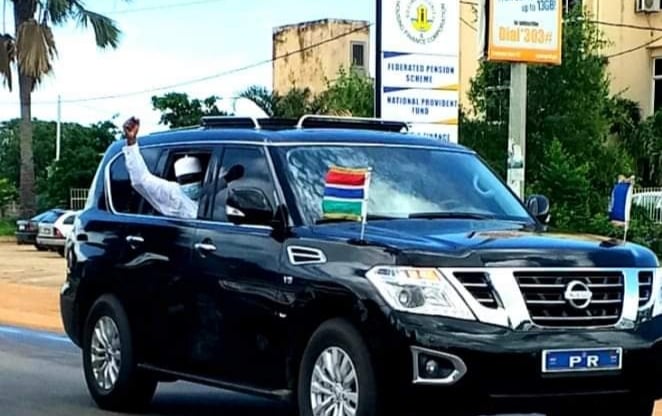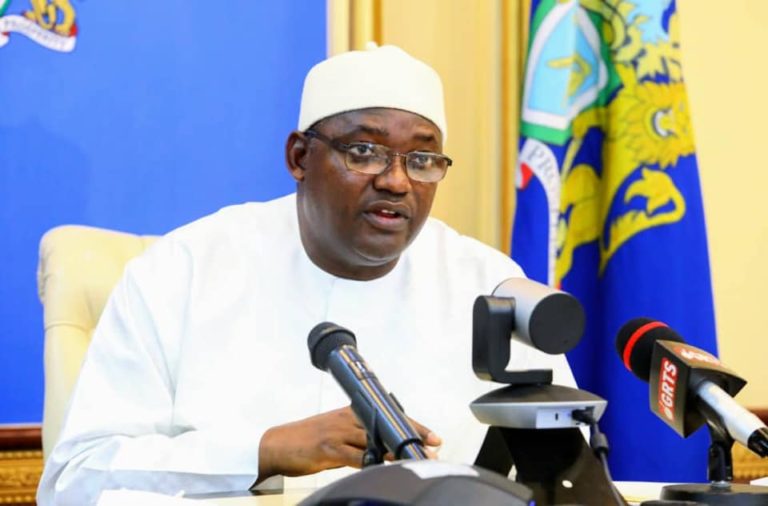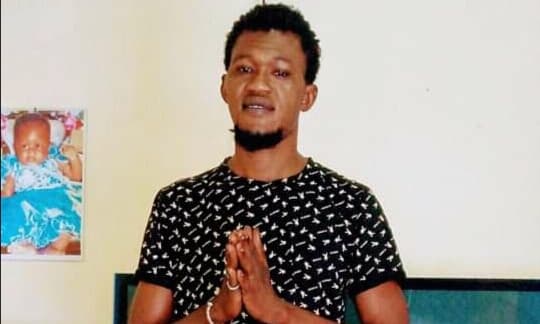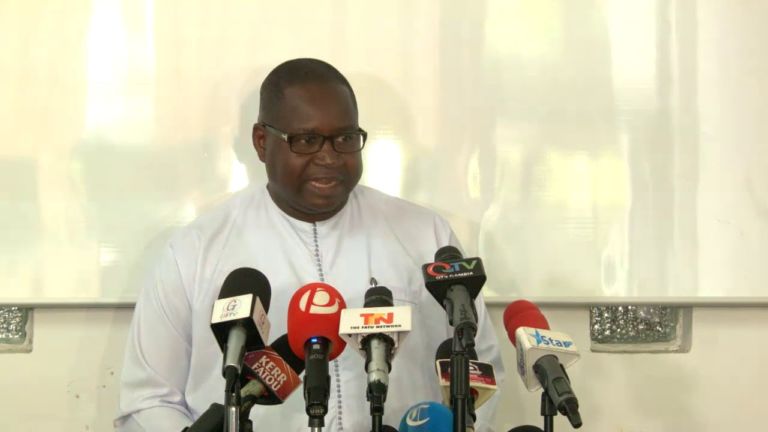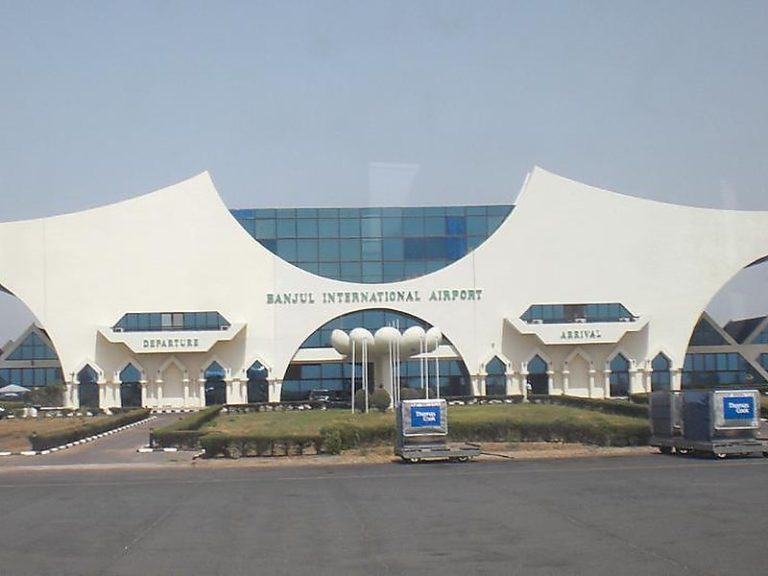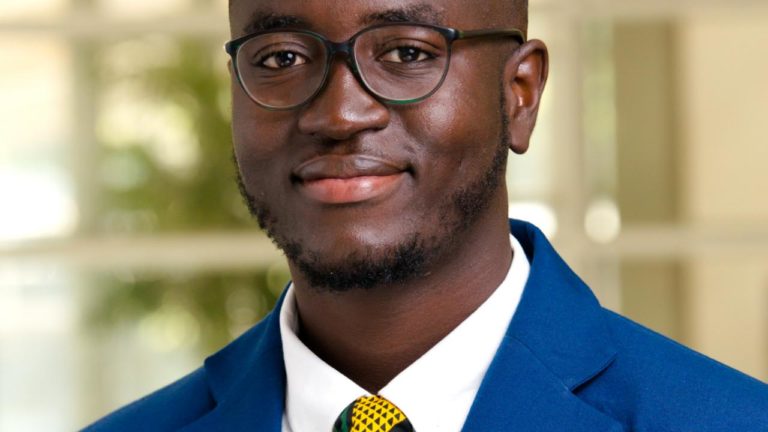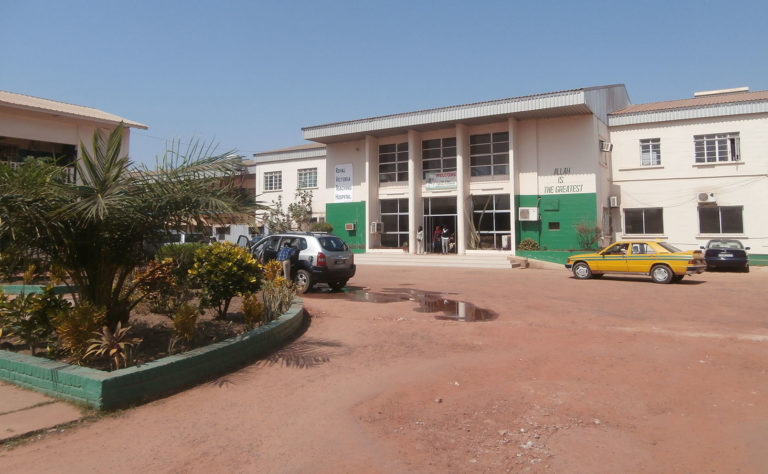Alasan Ceesay tells nation Rahma is more determined than ever before to soothe the living hardship of the average Gambian
By Lamin Njie
Alasan Gent Ceesay has stated Rahma Gambia Limited is more determined than ever before to make Gambia cheaper in terms of living, barely 24 hours of his release.
Mr Ceesay is trapped in a court battle over millions of dalasis he allegedly owes a business partner. He was on Monday taken to Banjul Police Station were he was held over the issue.
On Wednesday, the businessman spoke for the first time on the issue describing it as a ‘tough’ moment.
“The purpose of the video is to say thank you for the love that you’ve shown, thank you for all the support that you’ve given us, thank you for all the well-wishes that we had, thank you for all the encouragement that came our way during a very tough moment in our existence,” Ceesay said in a video posted to Rahma Gambia Limited Facebook page.
He added: “To wrap it up, I would say Rahma is only interested in what is good for you as an average Gambian. Which is to bring you healthy, affordable food because that’s what you deserve.
“We are more determined than ever before to pursue our mission which is to make Gambia cheaper to live [than] in every country in Africa and we’re very confident that we will achieve that.”
Esau Williams has NO reason to apologize! It is Minister Sillah who should apologize
By Madi Jobarteh
Minister Ebrima Sillah should apologize immediately to Gambians for his anti-media stance since he took over the position of Minister of Information. The fact that Sillah called the MD of QTV to raise concern about the Esau Williams interview amounted to interference with freedom of the media and imposing censorship. That call is an indirect pressure that sent a coded message to QTV to remove that interview from their YouTube platform. Therefore, it is utterly disingenuous for the Minister to sit before Fatu Network to try to rationalize, distort, mislead and deny his anti-media track record.
If Minister Sillah was not happy with the opinions expressed by Esau Williams in QTV’s Viewpoint show, all he needed to do is to ask QTV to give him a right of reply or use his weekly press briefing to respond to Esau as much as he likes. Therefore, Ebrima Sillah acted unethically to have called QTV. Evidently the Minister therefore infringed upon freedom of the media and freedom of expression for which he must apologize. I hereby call on GPU to send a note of concern to Minister Sillah to ask him to refrain from such underhand tactics just to stifle the media.
In this Fatu Network interview, just as in his interview of Coffee Time with Peter Gomez on West Coast Radio last Tuesday, Sillah spared no effort in lambasting and impugning the character of Esau Williams. Why should a Minister of Information, a journalist himself by trade, go after the person of a citizen for his opinions? Why is Ebrima Sillah seeking to undermine the integrity and professionalism of Esau Williams by referring to his work with the BBC. If indeed what Sillah said is true, I am sure Esau Williams knows the terms of employment of BBC hence he would not have violated those terms because Esau is a responsible gentleman. If he did, then by now BBC would have reprimanded, stopped and even sacked Esau Williams. But until today, BBC has not done that and Esau continues to do his job. Therefore, Esau has not violated any law at BBC.
Let me inform Ebrima Sillah that he is not supportive of free press in this country since he became Minister, contrary to his false claim that he stands for a free press. I know this because Sillah had expressed his anti-media stance to me. He had told me, sometime ago about his discomfort with radio talk show hosts that he believes must be controlled. He said some of these radio talk show hosts are not experts and so they cannot just speak about any issues without bringing in experts.
I retorted to him that radio commentators such as Pa Modou Bojang of Membekering radio or Pa Nderry Touray of Star FM or Peter Gomez of West Coast among others do not need to bring any expert. I reminded him that you have radio and television talk show hosts such as Kouthia in Senegal who speaks about every and any issue on TFM television in Senegal everyday and he is not an expert in everything. You have similar talk show hosts across Africa and the world. So why shouldn’t the Gambia have talk show hosts who just speak their mind from anthropology to zoology? I found his concern to be indeed worrying because it is undemocratic and anti media.
If the Government feels a talk show host is spreading wrong information about the Government, then let the Government refute the information. That’s all. The Gambia Government has so many media platforms to use including a Spokesman who writes even better than Shakespeare to respond. Therefore, Ebrima Sillah’s claim that he is for the freedom of the media is unfounded. He is not. The evidence is all over.
For example, when two radio stations were closed arbitrarily and their journalists arrested and detained in January 2020, Ebrima was not outraged about that. Otherwise he would have immediately demanded the IGP to leave the stations alone and to demand accountability for such authoritarian action. Ebrima should have resigned at that very moment unless the radio stations were opened. But Ebrima failed to resign and rather allowed the stations to remain closed for weeks until GPU had to threaten action leading to the National Human Rights Commission to intervene. That was shameful of the Minister.
Since he assumed office, which legal reform has this Minister spearheaded in order to greater protection and promotion of the freedom of the media? All the draconian anti media laws are still in place! In the Criminal Code, Information and Communications Act, the PURA Act as well as in the Newspaper Act, there are multiple anti-media provisions until today. Why has Minister Sillah failed to immediately cause those bad law to change? Because he is not interested in free media.
That the Gambia Government is corrupt is clear as noon day. This is confirmed by the Gambia Government itself. Not long ago, the Minister of Health stood on the floor of the National Assembly to acknowledge corruption. Well before that, in 2018 the Ministry of Finance commissioned a forensic audit of seven state-owned enterprises which showed massive corruption. Until today no action was taken to ensure accountability. Just recently the Auditor General acknowledged massive corruption as the Gambia Government refuses to implement his recommendations to ensure transparency and accountability.
All of these are different from the so-called anonymous donors, the Chinese money in FABB account or the dubious contracts to Semlex, Banjul Road Project, diplomatic passports, COVID funds, mining, and now Securiport at the airport, among many others. Therefore, why should Ebrima Sillah deny that corruption is in his Government? Indeed honesty is not common to all human beings.
Therefore I put it to Ebrima Sillah that what Esau Williams said that there is corruption in the Gambia Government is absolutely true.
I hope Fatu Network will also give me an exclusive interview as they gave to Minister Ebrima Sillah so that I can respond to his unfounded, misleading and hypocritical statements. Until then this is my initial response to the Minster.
For The Gambia Our Homeland
Nuimi FM manager Bubacarr Sonko at Barra Police Station over D190,000 in company money he allegedly diverted
By Lamin Njie
The manager of Nuimi FM Bubacarr Sonko AKA DJ Rocky Bi has been detained by police at Barra over claims he diverted funds of the radio.
Mr Sonko allegedly diverted D190,000 of the radio’s money to his own personal account. The money was paid to the radio by the Ministry of Basic and Secondary Education over online classes service the radio provided.
Nuimi FM CEO Yahya Sonko told The Fatu Network the incident happened over a month ago. A complaint was lodged at Barra Police Station on Tuesday leading to his detention, he added.
Police spokesman Superintendent Lamin Njie said: “We can confirm the report at Barra police station against Buba Sonko, that he diverted funds of the radio. He currently helping the police in their investigations.”
His radio has suspended him.
Airport fee! I support the government in asking citizens to contribute towards their own security
So many times we ask what our government is doing for us but hardly do we ask what we do for ourselves and our country.
Since news of the new airport levy came out, a lot of Gambians online have been attacking the government over the new move to pay 20 dollars when using the airport. This prompted me to find out about the move.
I have spoken to government officials and it has become clear the new move is not an attempt to illegally or unfairly take money from anyone. What the government is doing is to simply ask citizens to contribute to their own security.
Countries in all parts of the world including our Neighbors next door Senegal are all using this system. We just aren’t aware as the airlines are not transparent!!!!
Integrated Immigration Control System control at borders is actually the real deal if we want to support our government in fighting crime. Our borders are used by different kinds of people and this is a system that can quickly detect criminals, be it drug dealers, paedophiles. These are people we certainly do not want in our country. So supporting the government in making us more secure as a country by contributing just 20 dollars should not be a big issue.
Airlines always add fuel increase charges? Yesss!!!!! But do they decrease these prices when fuel goes down?! Nooooo!!! Never!!!
Do I mind paying more for an airline they may be going bankrupt ? yes. Do I mind paying the security tax if it can help catch a child predator ? or a human trafficker?? Nooooo!!!!!
The airlines that are encouraging their passengers not to pay the levy are just here for business. They are not interested in what is really in our best interest as a nation. What we have seen is that since the coronavirus pandemic began, fuel price all over the world has been going down but all what we have seen is the airlines increasing ticket price. This is what passengers should focus on interrogating and not government coming up with measures that will make us safer as a nation.
Lamin Manneh, concerned Gambian
SAMSUDEEN SARR – COMMENTARY: In search of President Adama Barrow’s Ecowas speech
Ever since my first assertion that President Adama Barrow of the Gambia could be clinically dyslexic, I have been adamant on it and trying to confirm my suspicion by collecting and studying all his video speeches in English delivered at home and abroad. I am however finding it very difficult to get the one at the 57th session of the ECOWAS heads of state held at the capital city of the Republic of Niger, Niamey, September 7 to 9, 2020. I was hoping to at least find it at the Gambia-Statehouse Facebook wall where such important events are usually carried; however other than his ceremonial departure from the Gambia, arrival at Niamey, reception at the conference hall, shown in the presidential group picture wearing blue face mask and his final departure after the meeting, nothing of the video-speech was posted. I have also been asking around but yet to find someone to tell me where it can be found. The voice I heard reading some parts of it was not Barrow’s but of some reporter who really seem to understand what he was reading about.
Whereas I do not attribute dyslexia to any lack of intelligence but could instead affect highly intelligent people, I nevertheless remain consistent in my conviction that a dyslexic person has no business being a head of state. It’s like voting a naturally blind or deaf person as president. In the same way a blind and deaf leader would have faced the stumbling block of not seeing or hearing the jurisdiction he/she controls, equally so would a dyslexic head of state be rendered ineffective in carrying his or her duties that requires good reading and comprehension skills. And unless our president is medically proven otherwise I will continue to make this argument no matter what.
Yes, his written speech at the ECOWAS meeting has been shared with every media outlet which doesn’t remotely look like something he can ever write although it highlights one attention-catching issue about the extension of the mandate of ECOMIG in the Gambia that should concern every Gambian.
We all know that the extension request from Barrow was just a formality, because President Mackey Sall, in a trip to France last week was mainly to ask the French government for the funds with a new false narrative that the Gambia is still going through an unstable democratization process for “four God darn years”. Always portraying us as knuckleheads who know no better. For a proof, our president will frequently be exhibited as a classic example of who Gambians are emotionally and intellectually.
Of course, France is very happy with their chief sub-regional puppet Mackey over his firm grip of the Gambia through Adama Barrow, “his brother from another mother” and will keep on financing the troops with endless promises about why it will only serve their Neo-colonial interest.
That could somehow be right but financing the troops also serves the economic interest of the Senegalese army constituting the bulk of the foreign soldiers in the country . In these difficult times they are making a lot of money out of the fraud by rotating contingents in a mission whose termination could cause unpredictable financial difficulties to their over-bloated Armed Forces. Talking about Security-Sector Reform, I even think Senegal now needs it more than the Gambia.
Remember how the so-called ongoing Security-Sector-Reform used to be the only excuse for keeping the troops in the Gambia? With no end in sight of that hopeless reform, they are now including the expected destabilization of the nation from the implementation of the TRRC recommendations. What kind of fools do these people think we are with all these infantile stories?
I don’t know about the rest of you, but looking at the magnitude of the racket, I will not at all be surprised with another justification in the next six months of how they must stay “to ensure that the Gambia’s presidential election is freely and fairly conducted” when their primary objective will be to help their desired candidate rig the polls. France will of course be deceived into always sending the checks to Dakar.
To our liberation strugglers still mulling over their delusion of owning the strategy that voted out the APRC government for a greater and better regime but will never find the honesty of admitting that their hard-fought victory was long ago usurped by France and Senegal, I have another bad news for you. The Senegalese occupation force and political control of the Gambia is here to stay and they will do whatever it takes to perpetuate an NPP government with their preferable leader, President Adama Barrow in charge whom they will sponsor to victory in 2021.
And for the opposition parties forming and hoping to defeat Barrow next year without addressing the destructive Senegalese dominance, I wish to say tough luck to all of you buddies. Other than the APRC assuring the Gambians an immediate expulsion of these useless foreign troops under an illegal arrangement, I hear no party leader discussing what to do with them after victory in 2021. Some, I understand are entertaining clandestine plans of maintaining the same relationship with Senegal and to keep their troops around for lack of trust of our security forces which to me sounds very foolish because Senegal, as far as a Gambian leader is concern, is perfectly satisfied with Barrow’s caliber and collaboration. Any other contender may be too risky for Mackey Sall to choose over his “brother”. So far everything Sall wants for Senegal and France can be achieved through President Adama Barrow whose valuable position of never questioning anything from Dakar is a treasure trove of unspeakable proportion. Why then another Gambian leader especially a smart one who will not want to only appreciate his good meals, join free flights wherever he is ordered to go, enjoy his siestas at international conferences, hide from the press and struggle to read speeches he is coached to regurgitate without understanding their contents? Historically, they have learnt in Presidents Dawda Jawara and Yahya Jammeh that any Gambian chosen for their agenda different from the disposition of “Adama Barrow” is doomed to fail.
Ordinarily, President Barrow should have been the new ECOWAS chairman for having at least another year in office instead of President Nana Akufo-Addo of Ghana who faces the probability of being voted out of office in their next presidential election due in December, 2020. Although I am rooting in for his reelection.
But I guess after catching a glimpse of our well-fed president seemingly doing what he does best in conference halls, napping in style, they disregarded all the odds and settled for Nana.
In fact his inability to properly read and understand the English language is my only interest to listen to his speech at the Niamey-ECOWAS conference whether by video or audio. I will appreciate anyone knowing where to find the whole speech to please let me know. The recording should be at the GRTS and should have as expected been played for the public by now. But did they? If not, why?
And please spare me the nonsense that our president was merely luckier than others to be elected or that the position was a preordained gift he has received from the Almighty God. I don’t believe in either jive. The job is a responsibility requiring the best performer and certainly a challenge not for infirm minds or clueless notables.
All notable leaders at Niamey, including invalid Muhammadu Buhari of Nigeria protested against their irrational counterparts, urging them to respect their constitutional two-terms tenure in office, the hottest global topic affecting Mackey Sall’s fellow French puppets, namely Ouattara and Conde of Ivory Coast and Guinea Conakry respectively. The idiotic practice endorsed by their French masters is now the major cause of national instability to so-called African democracies, likened to coup d’etats and rebellions. Why was Barrow silent on the issue? Did Mackey Sall warn him not to comment on the subject, lest he withdraws his troops that “is stopping the Gambian population from forcing him out of the Statehouse”?
Just for those who didn’t know ,that was exactly how Abdou Joof used to blackmail Sir Dawda Jawara about the importance of the Confederation forces in the Gambia from 1981 to 1989 with Kukoi Samba Sanyang being the boogyman always waiting in the periphery. Jawara at the time didn’t understand that the longer the foreign troops stayed in his country, the harder to replace them when they leave until it was too late. Can’t any of Barrow’s advisers, politicians or technocrats enlighten him about this? Only dumb leaders will depend on foreign forces for their national security.
SAMSUDEEN SARR
BANJUL, THE GAMBIA
And Fatou Kinteh completes her own recovery! Women Minister Fatou Kinteh recovers from coronavirus
Minister of Women Affairs, Children and Social Welfare Fatou Kinteh has ‘fully’ recovered from the Covid-19 Virus after her retest turned negative.
“Accordingly, Minister Kinteh has since been discharged and is fit to return to work as she is well and totally asymptomatic,” government spokesperson Ebrima Sankareh said in a statement late on Tuesday.
Sankareh added: “It can be recalled that Madam Kinteh had initially tested positive for COVID-19 on 3rd August, 2020.
“Subsequently, Hon. Fatou Kinteh tested negative after a repeat test and discharged from the Covid isolation Centre on 3rd September, 2020..
“The Gambia Government urges members of the public to continue following the Covid-19 Regulations outlined by The Health Ministry and World Health Organization on the Covid pandemic. Hand washing, face covering, social distancing and limited social gatherings are the new normal and all are encouraged to follow.”
She is now the third minister to recover from the virus after Mambury Njie and Fafa Sanyang.
President Barrow and his fellow Ecowas leaders give Mali junta until September 15 to name a president
West Africa’s regional leaders have given the military junta in Mali until Sept. 15 to name a transitional president and a prime minister, according to a statement read at the end of a summit on Monday.
The heads of state of the 15-nation Economic Community of West African States (ECOWAS) said the president and prime minister, who will lead the transitional government, should be civilians.
The bloc, seeking to keep pressure on the junta, maintained sanctions it had placed on Mali, but welcomed steps taken by the junta in the past week to start talks with Mali’s political parties and civil society groups over the transition.
The ECOWAS union has closed its borders with landlocked Mali and halted financial flows amid concerns from some West African leaders the military coup could undermine their power and democratic gains in the region.
A group of army colonels has ruled Mali since ousting President Ibrahim Boubacar Keita on Aug. 18. No consensus has yet been reached on the make-up and duration of a transitional government ahead of promised elections.
ECOWAS is calling for a swift return to civilian rule and a vote within a year, a timeline the junta, the National Committee for the Salvation of the People (CNSP), has not committed to.
ECOWAS Commission President Jean-Claude Kassi Brou, said both the president and prime minister must be appointed by Sept. 15 at the latest.
Talks in the capital Bamako about the transition period got off to a bumpy start on Saturday, when supporters of the influential M5-RFP political coalition accused the junta of sidelining them. (Reuters)
Businessman Alasan Ceesay spends night at Banjul Police Station as bail proves difficult
By Lamin Njie
Businessman Alasan Ceesay spent the night at Banjul Police Station because he couldn’t complete the paperwork laid down for bail by the court, police spokesman Superintendent Lamin Njie has confirmed to The Fatu Network.
“I am made to understand that Alasan Ceesay spent the night at the Banjul station because he couldn’t complete the paperwork laid down for bail by the court,” Njie said while quickly adding the businessman’s case is not a police case rather an enforcement of a court order. He was still at the police station as at 12pm Tuesday, the police spokesman added.
The communication firm working for Ceesay, Picasso Global Communications said it has no comment.
Ceesay is fighting to dig himself out of a civil lawsuit brought against him by a business partner – who has accused him of owing him over 19 million dalasis.
Photojournalist captures President Barrow waving at small crowd from window of his car as he returns to the country from Niger
A photojournalist showed his brilliance Tuesday afternoon by capturing President Adama Barrow waving at a small crowd on Bertil Harding Highway while travelling back to State House from a trip abroad.
President Barrow left the country on Sunday for Niamey, Niger to take part in a summit of Ecowas leaders.
Photojournalist Ebou Waggeh snapped the president near Social Security and Housing Finance Corporation Tuesday afternoon. The president’s fisted hand could be seen up in the air from the window of his car as he drove past.
Two big events on the agenda as National Assembly announces its latest round of sessions
The Office of the Clerk of the National Assembly announced Tuesday the Third Ordinary Session of the National Assembly in the 2020 Legislative Year ‘shall’ be convened for the period Monday 14th – Thursday 24th September, 2020.
“During this period, Hon. Members will consider the Constitution of the The Republic of The Gambia (Promulgation) Bill, 2020 and other important Government and National Assembly businesses.
“His Excellency, the President of the Republic in accordance with Section 77 (1) of the 1997 Constitution, and Clause 24 (1) of the Standing Orders of the National Assembly will also perform the State of Nation Address (SoNA) on Thursday 17th September, 2020,” a statement on the National Assembly’s official Facebook page said.
The statement added: “Daily Sitting commences at 10:00am prompt.
“The public is further informed that the Assembly will restrict the admission of strangers into the public gallery due to Covid-19 Pandemic
“Accordingly, entrance to the SoNA shall be strickly by invitation.”
Full text of President Adama Barrow’s statement at Ecowas summit
Mr. Chairman, Excellencies Heads of State and Government, ECOWAS, AU, UNOWAS, Delegates, Distinguished ladies and gentlemen,
I extend sincere appreciation to the Chairman, His Excellency, Mr. Mahammadou Issoufou, President of the Republic of Niger for hosting this significant Summit.
By the same token, I thank His Excellency, President Issoufou for the leadership he has demonstrated and the vigour with which he tirelessly coordinated the mediation efforts in the Republic of Mali during these past weeks.
Your Excellencies,
Amid the COVID-19 pandemic, our sub-region still faces political and security threats, including electoral issues and their negative impact on efforts to sustain an enabling environment for development. This calls for urgent attention and engagement with our partners to find durable solutions to such persistent challenges.
Having said this, I appreciate the efforts undertaken by the ECOWAS Commission and its partners in curbing terrorism in West Africa, especially in the Sahel Saharan Region and the Lake Chad Basin.
We should all endeavour to ensure that the concrete steps proposed during our last assembly in Abuja are implemented to the fullest through collaboration and, of course, the support of our development partners.
Your Excellencies,
On the situation in Mali, I join everyone in applauding the ECOWAS Mediation team headed by His Excellency, Dr. Goodluck Jonathan, former President of the Federal Republic of Nigeria, for the position taken to broker dialogue and foster a lasting solution to the impasse in the Republic of Mali.
Having reviewed and taken decisions on the situation in Mali, in line with ECOWAS protocols relevant to Democracy and Good Governance, the Community needs to ensure that the transition programme is followed as stipulated and that, at the end of the process, the country successfully returns to normal constitutional order.
Your Excellencies,
Our presence here in Niamey for this Fifty-seventh (57th) Ordinary Session of the Authority of Heads of State and Government provides us with a platform to discuss matters relevant to the development of our sub-region and the safety and wellbeing of our peoples.
In The Gambia, in pursuance of establishing peace and security for development, my Government, with the assistance of ECOWAS and other partners, has embarked upon a robust security sector reform, aimed at bringing the security services fully under civilian democratic control. We are ensuring that our human resource and structures are appropriate for the country’s national security needs, and that the men and women in the armed and uniformed services play a meaningful and positive role in national development. The African Union and other partners have provided expertise to help us restructure the security architecture.
On the other hand, this august body has mandated ECOMIG to execute a stabilisation mission in The Gambia. Their mandate has been extended periodically, thus guaranteeing the stability needed for the Government to undertake meaningful inclusive socio-economic development for all Gambians.
I seize this opportunity, therefore, to express my Government’s satisfaction with the ECOWAS Peace Support Operations in the sub-region, which focuses on operations within agreed terms of engagement.
With profound appreciation, I thank all Member States and the Commission for the smooth operations of ECOMIG in our country. However, the current mandate of this contingent has reached its expiration period.
Your Excellencies,
Given the reforms underway and the need to protect the fragile democracy in The Gambia, I avail myself this privilege to request for the extension of the mandate of ECOMIG in The Gambia. It should be noted that our Security Sector Reform is at an advanced stage and, for the first time, an audit exercise has been conducted in the army and a policy developed.
The reform process remains sensitive, noting that the previous government had molded the security apparatus of the country to serve as a repressive mechanism.
As such, a range of uncertainties, including right sizing and profiling the Armed Forces, matters of disarmament and demobilisation of troops remain complicated matters to address. As the reform process is ongoing, Government and its partners need to work with caution in order to complete the process successfully.
For these reasons, the presence of ECOMIG in the country will be a stabilising factor, while providing, at the same time, the required capacity building support for the viable implementation of the sector reforms.
Your Excellencies,
I will conclude by encouraging all of us to collaborate more closely for the advancement of our sub-region and for the wellbeing and development of our peoples.
I thank you for your attention.
Brutal fist fight over a mobile phone leaves 25-year-old Sukuta man dead
A 25-year-old man from Sukuta has died following a brutal fist fight that saw him square off with a man who is two years younger.
Foday Camara succumbed to injuries he sustained from the vicious fight on Monday evening at the Black Market in Serrekunda.
“It was a mobile phone dispute between the two of them that degenerated into a fight. Blows were exchanged and the victim sustained injuries from the exchange of blows. He was rushed to the Sukuta Health Centre and he was pronounced dead,” Superintendent Lamin Njie said.
The suspect, 23-year-old Omar Baldeh from Churchill’s Town is under police custody helping the police in their investigations. The Fatu Network understands his victim is a father of two.
Government asks strike-ready market vendors to continue to exercise patience as their concerns are being considered in upcoming regulations
The government today called on the country’s market union to continue to exercise patience and understanding, revealing their concerns are being considered in the upcoming regulatory cycle.
The government has been scrambling to prevent the union from embarking on a strike that could see the country’s markets go without food and other essential items.
The union called off a strike scheduled for Monday 7 September after the government promised that their concerns were going to be addressed on Monday. The government has now returned to the union with empty hands.
The market union wants changes to the time their members are allowed to be at the market for business.
The government today said in a statement: “Following preliminary meetings between the Government assigned interlocutor and The Gambia Market Union officials on Friday and a subsequent discussion with The Interior Minister, Mr Yankuba Sonko on Sunday, The Gambia Government made significant progress Monday afternoon after hours of intense deliberations.
“During a meeting chaired by Vice President, Dr Isatou Touray, the Cabinet Sub-Committee on the Covid-19 Pandemic, expressed gratitude and appreciation to the Market Union for their thoughtfulness conveyed in their letter of 21st August, 2020 appealing to the Government to relax some of the latest Regulations affecting market schedules throughout The Gambia. Vice President Touray and her Cabinet colleagues recognized the plight of the market vendors and how the new Emergency Regulations may have inadvertently affected their businesses.
“On the contrary, the New Regulations were promulgated into law to help protect and save the entire country from the looming danger of the deadly Covid-19 virus that has been ravaging humanity since November, 2019.
“From the onset, The Gambia Government conscious of the financial impact of the Covid-19 virus on the global economy and its crippling effects on local economies, avoided a total lockdown to help mitigate its full effects on our local businesses.
“However, following a cautionary examination of their concerns, the Government recognizes how these unintended consequences may have potentially affected their businesses and is diligently working out new modalities and strategies to accommodate their needs.
“Therefore, considering that legislative processes are highly procedural, very technical and time-consuming, The Gambia Government asks that The Market Union continues to exercise patience and understanding as their concerns are being considered in the upcoming Regulatory Cycle.”
Anger as government introduces new law at airport which will require travellers pay up to D2,000
By Fatou Camara II
The government has come under criticism following the introduction of a new travel law which imposes charges of up to D2,000 on air travellers.
A letter purportedly by Gambia Civil Aviation Authority and written to airlines companies in the country emerged online since on Monday and it shows the authority informing the companies the government is implementing the new law dubbed, ‘Immigration Security System Levy’, at the Banjul International Airport.
The letter says collection booths have been installed at the airport to ‘manually’ collect the levy from passengers – with each departing and arriving passenger required to pay 20 dollars (D1,000).
A government spokesperson on Tuesday struggled to say where the unpopular move came from. A Gambia Civil Aviation Authority official could not also comment on the issue.
Gambians carpeted the move online on Tuesday insisting it could discourage tourists from coming into the country.
Nyang Njie said: “The Government of the Gambia has in effect made Leopold Sedar Senghor our main Airport. There are many Gambians flying in and out of this airport due to the frequency of flights and ticket pricing.
“The recent tax levied on passengers at Banjul International Airport will be the beginning of the end for an airport that is neither competitive nor sustainable. Sad days ahead in Gambian aviation.”
“This is so outrageous to see. I really don’t see the rationale behind this daft idea. Now is not the time to be increasing taxes on travellers when we looking to revive the airline and tourism industry. This means a family of four coming into The Gambia will have to pay an extra $160 on their holiday bill,” Raffie Diab said in a Facebook post.
Abdou Aziz Sarr: “The Government is being insensitive to the financial implications of the pandemic and the difficulties of the tourism industry. This is not the time to increase cost of traveling. We need to encourage not discourage tour operators and travelers. Look at the big picture.”
Alasan Ceesay at Banjul Police Station, his communication team confirms he has been detained
By Lamin Njie
Alasan Ceesay who goes by the name Alasan Gent Ceesay on social media is currently at Banjul Police Station over a civil matter, police spokesman Superintendent Lamin Njie has confirmed to The Fatu Network.
“He is not under police arrest as such, it’s a matter of the court. The court is the one that came with him to the police,” Superintendent Njie said.
The businessman’s communication team told The Fatu Network their client has been detained.
Picasso Global Communication said: “I can confirm that our client has been detained by the police regarding private business transactions with his partners.
“These things are not unusual in business. We are doing all we can to secure his immediate release.
“The situation is much more complicated than it simply meets the eyes. But whatever it is, Allāh is the best of planners.
“In shaa Allah we will emerge out of this stronger and continue to break down barriers and inspire Gambians to take charge.”
It comes less than 48 hours since The Fatu Network reported a multi-million dalasis civil case he is involved in.
A business partner last month sued Mr Ceesay over 19.2 million dalasis he owes him. The business partner through his lawyers lodged a complaint at the high court that Ceesay took thousands of bags of rice and thousands of drums of oil but failed to pay him within two weeks of the date of delivery of any consignment.
President Barrow insists on reforms and fragile democracy before asking Ecowas leaders to extend the mandate of ECOMIG
President Adama Barrow on Monday told his Ecowas equivalents the presence of ECOMIG in the country will be a stabilising factor, as he singled out reforms as the reason for his request for the extension of the force’s mandate.
“Given the reforms underway and the need to protect the fragile democracy in The Gambia, I avail myself this privilege to request for the extension of the mandate of ECOMIG in The Gambia. It should be noted that our Security Sector Reform is at an advanced stage and, for the first time, an audit exercise has been conducted in the army and a policy developed,” the president said on Monday as he spoke at the 57 ordinary session of the authority of heads of state and government of ECOWAS.
The president added: “The reform process remains sensitive, noting that the previous government had molded the security apparatus of the country to serve as a repressive mechanism.
“As such, a range of uncertainties, including right sizing and profiling the Armed Forces, matters of disarmament and demobilisation of troops remain complicated matters to address. As the reform process is ongoing, Government and its partners need to work with caution in order to complete the process successfully.
“For these reasons, the presence of ECOMIG in the country will be a stabilising factor, while providing, at the same time, the required capacity building support for the viable implementation of the sector reforms.”
UDP’s youth wing thanks World Bank over multi-million dollars support but then warns Gambia can’t continue on path of begging
UDP’s youth wing on Monday thanked the world bank for coming to the aid of the Gambian people through their 31 million dollars cash transfer project for rural households.
“This couldn’t have come at a better time for The Gambia considering the poverty and suffering our people go through on a daily bases,” the wing in a statement signed by Kemo Bojang secretary general said.
The wing however insisted that “as grateful as we are for the help, we cannot continue this state of affairs where our basic needs are fulfilled only through help from donor parties”.
“We have enough resources and capacity to be self sufficient in food production and a UDP government will invest heavily in agriculture to reverse this trend,” the wing said.
It added in its statement: “Adequate investment in agriculture will have the twin effects of ensuring food security and creating employment avenues for the youth to remain in their communities while being gainfully employed either in direct production or processing of agricultural produce through the value chain that will be created in collaboration with private sector entities.
“The Gambia cannot continue on this path of perpetual begging for the most basic of human needs, any serious government would know that and adequately address it.”
Much-bashed EFSTH sets out to investigate circumstances around death of Bakau mother
Edward Francis Small Teaching Hospital is investigating the circumstances around the death of Fatoumatta Dibba who died after being allegedly turned away by the hospital.
The Bakau mom reportedly had complications while giving birth to twins at a local clinic, prompting the clinic to refer her to the nation’s top hospital. Staff there allegedly turned her away – as she reportedly died in the ambulance outside the hospital.
A statement signed by the hospital public relations officer Kebba Sanneh said, amid heavy criticism directed at the hospital: “The reports circulating in the media of the regrettable and heartbreaking events leading to the untimely death of a young mother at our hospital have come to the attention of the Management of the Edward Francis Small Teaching Hospital. We would like to express our sincere condolences to the bereaved family.
“Any death that occurs in the hospital is reviewed as a routine and we take any allegations levelled against the hospital and its staff very seriously. In this case, we have deemed it necessary to launch an urgent and comprehensive investigation into this matter, to piece together the exact events that transpired at EFSTH on that fateful day, and any other relevant information surrounding the case, so as to take concrete steps to try and ensure that a similar event does not occur again.
“The general public should be reassured that in the interest of transparency, the outcomes of the investigation shall be communicated in due course. In the meantime, we would also like to reassure the general public and all referring institutions that we continue to operate as best as normal to continue to provide tertiary and referral services despite the current COVID pandemic situation in the country. We would also like to reassure the general public that there is no policy in our hospital to turn away any patient in need of our services.”

